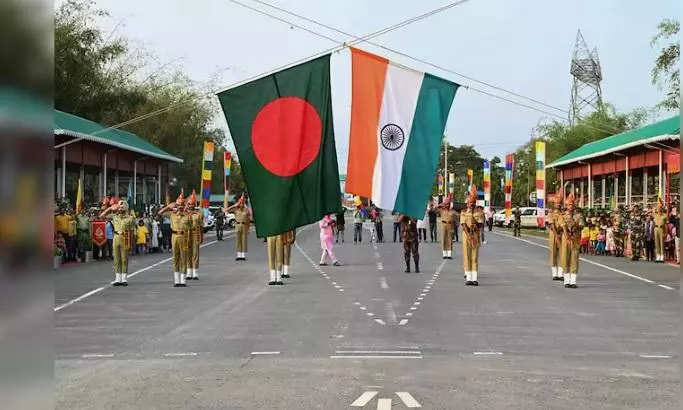
The dissonance in India-Bangladesh relations
text_fieldsSince Bangladesh Prime Minister Hasina fled to India on August 4 last year in the wake of a raging popular upheaval, our neighbouring country, which had maintained close friendship with India, is seemingly heading towards the opposite direction, show the frequent incidents. Most recently, Bangladesh has canceled the judicial training program scheduled to be held from February 10 at the National Judicial Academy in Madhya Pradesh. Scheduled as per a bilateral decision earlier, the training program was to be attended by 50 judges and judicial officers. For the second time yesterday, a Bangladesh court issued an arrest warrant for the former Prime Minister Hasina living in India. The interim government of Bangladesh had asked India to hand over Hasina in December after cases in courts accused her of arresting and detaining in secrete places or causing to disappear more than 500 citizens. The warrant has been issued again after India refused to heed. The Bangladesh government and the courts maintain that Hasina should be tried legally and given the appropriate punishment if found guilty. In the years when the Awami League was in power, the country’s relations with India was cordial and the India-Bangladesh agreements were highly beneficial for both countries. Alongside mutually helping in areas including trade, infrastructure development, and fuel transactions, India trained Bangladeshi soldiers as well. On the other hand, Bangladesh's relations with Pakistan continued to be worse. This situation is undergoing a radical change after the Hasina government’s fall following mass upheaval involving students. Most of those joined the interim government led by Nobel laureate Muhammad Yunus are intensely anti-India. They allege that the neighboring country was complicit in the atrocities committed by the Awami League government in the past.
They also point out that the extreme measures including the hanging of their leaders were taken against the main opposition BNP and Jamaat-e-Islami by wholly disregarding justice and international law. It is in this context Bangladesh is demanding the extradition of Hasina. It is understandable how difficult it must be for our government to immediately accept this demand. At the same time, the Modi government cannot prolong this dilemma indefinitely. It is clear that the government is closely monitoring the situation and is responding with great caution. One important reason is the fact that the new Bangladesh government is trying to get closer to China and Pakistan. Alongside, the complicated situation of refugees flowing to the country as had happened during 1971 war cannot be taken lightly. Our government’s decision is to prevent all kinds of infiltration. The suspension of export of goods such as machinery, textiles, chemicals and others in large quantities to Bangladesh is a cause of concern for India. Meanwhile, the ongoing propaganda in India that Hindu-Buddhist and Christian minorities are being subjected to severe attacks in the neighboring country is also adversely affecting bilateral relations. The government has officially expressed our country’s concern over the incidents of violence against minorities.
However, Bangladesh maintains that the widespread propaganda happening in India over the incidents has no basis. They respond that India is spreading isolated incidents in a highly exaggerated manner. Though similar incidents had taken place during the Awami League regime, no one made an issue of it but after Hasina’s fall anti-Bangladeshis are spreading colourful stories, they argue. In an interview with India Today, Bengladesh government’s press secretary Shafiqul Alam said that the problem is many in India cannot accept Hasina's ouster. Another fact is that Awami League members are also involved in the ongoing violence. The Bangladesh Hindu Jagran Manch was formed along the lines of the Sangh Parivar in India. ISKCON monk Chinmayadas is known to be a leader of extremists. That is why there has been no positive response from Bangladesh to the calls from India to release him from prison. In any case, Bangladesh Army Chief General Waker-uz-Zaman’s statement that 'India is an important neighbor. The two countries should have relations based on justice' is relevant for the future. It is not in the best interests of any country to be at odds with all neighboring countries at the same time.























